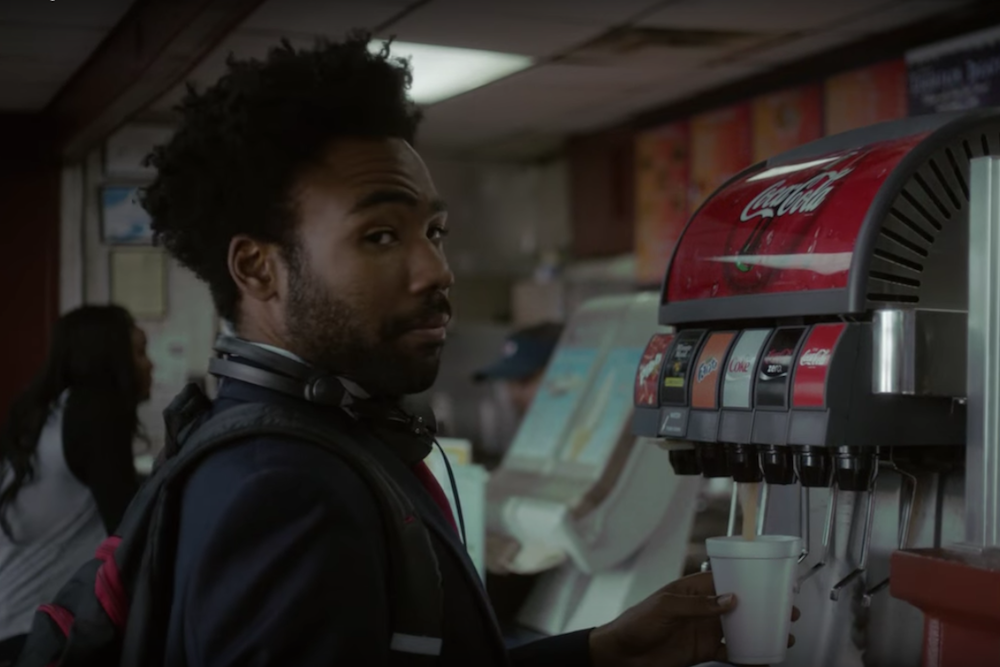Atlanta is about a city whose population is roughly 54 percent black. It’s the prime setting to represent the multitudes of blackness, and you get that sense from the establishing overhead pans that range from the cul-de-sacs to the debris-covered buildings, the scene of children imitating gunplay near low-income housing, and the mesmerizing wide shots of the surrounding metropolis. As beautiful as some of these views are, the camera doesn’t romanticize Donald Glover’s hometown. These shots create a sense of normalcy, saying that blackness isn’t an other — a curiosity for the white eye — but a way of life. If the goal of the series is to show white people what black culture is, this is one way to do it.
Donald Glover plays a guy named Earn, a financially struggling father who tries to put himself on the come-up by managing his cousin, a rapper known as Paper Boi, whose self-titled track is a current street hit. (It is for us, too — if FX doesn’t at least try to push this as a single, it’ll be a network’s biggest missed opportunity for a crossover song since Hey Arnold!‘s “I Saw Your Face and Wow”; it’s harder than anything off of Childish Gambino’s STN MTN mixtape.) The focus on Atlanta as an organic construct slows the plot’s movement; the early episodes play out like half-hour vignettes instead of a continuing serial.
This isn’t to say that Atlanta twiddles around, though; the show’s granular focus builds on the characters’ worldviews instead of following a more linear rags-to-riches route. Paper Boi, born Alfred Miles, is the reluctant pragmatist who balances street life and music not for the sake of glamour, but out of necessity. Earn and his baby’s mother Van (Zazie Beetz) are two people trying not just to make ends meet financially, but to rise to the potential they see in themselves.
On top of being relatable, what makes the cast compelling is their ability to articulate themselves without preaching to the choir. During a key date scene in the third episode, one of the characters says that he believes, “we need a chance as humans to fail in order to discover what actually works.” Sentiments like that resonate because it tersely captures the story of how many young African-Americans are robbed of that luxury.
Atlanta trades in Glover’s propensity for pursuing sophomoric yuks to instead follow Louie’s brand of biting black humor. The slice-of-life jokes stick — like the one about being broke as hell on a dinner date with a try-hard waitress at your table. When it strikes on a philosophical level, overarching questions are treated bluntly: Who gets to commodify African-American pain? Did the Black Delegation ever come to a consensus on whether racially ambiguous people can say “nigga?”
In the second episode, Earn witnesses a display of police brutality against a mentally ill man. That this too-familiar horror happens just a few scenes after he and Paper Boi joke about spotting a known video model keeps the show grounded. The show’s humor doesn’t solely seek to subvert an ethos, nor does every growing pain serve as wider commentary. Atlanta’s script is nuanced enough to escape such a dichotomy; pain, cracking jokes, desire, and what’s in between — that’s just what being black is.
That viewpoint undoubtedly sets Atlanta‘s debut apart from the rest of autumn’s television premieres, and it’s also the same thing that helps separate this show from the rest of Glover’s work. In interviews, he’s spoken openly about the difficulties of growing in a public space while being aware of the dangers of having a black body. But his sharp perspective has rarely translated into his art. Glover’s stand-up has its spurts of brilliance but usually falls short when poking at racial satire, settling for boyish shock quips instead of original insight.
He was worse off as the rapping Childish Gambino, where his on-mic persona was a mix of the mantra “Whatever they say I am, that’s who I’m not” and very petty, very unfortunate punchlines. It truly reached a nadir with 2011’s Camp: Gambino spends nearly the entirety of that album rioting against being the awkward black kid and raging against the white gaze. But he doesn’t really have anything to say that’s distinctive about his own experience as an African-American — nor does he exhibit any sense of self-awareness. So the result is gas-filled with lines like “I’m in her ass like sodomy.” The convoluted Because the Internet, from 2013, showed a marked improvement and teased a new lane as a pop songwriter before he bowed out with STN MTN/Kauai, his most recent release under the Gambino moniker. Both projects still lacked a fully developed perspective.
With an all-black writing staff on duty, Atlanta may become Glover’s first essential work because of how clear and unique its point of view is. The show doesn’t claim to be the definitive portrayal of The Black Experience nor does it pretend to know the answer to defeating larger, anti-black constructs. It unclenches righteous fists to deliver an empathetic glance inward, finding power in letting its characters simply be.





